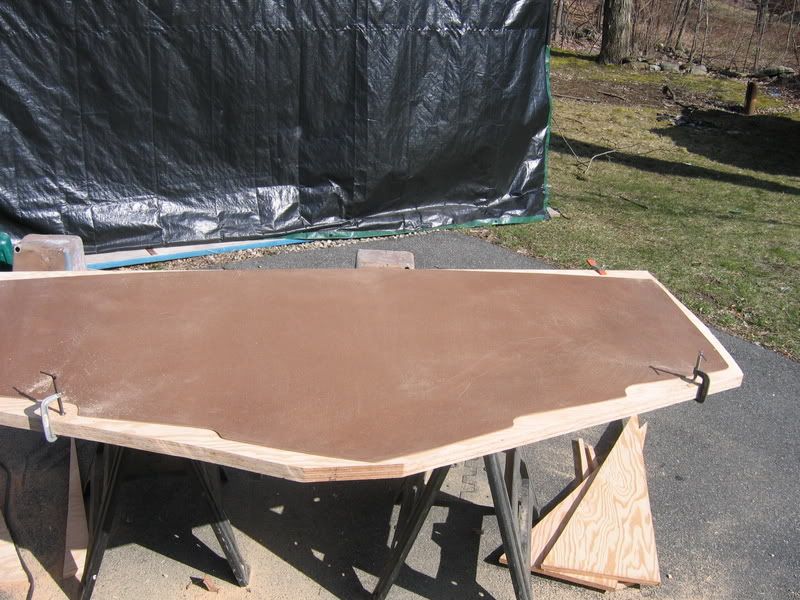
 |
|
#11
|
|||
|
|||
|
3rdday
Quote:

|
|
#12
|
|||
|
|||
|
Greenwood xl panels are basically decent quality doug fir ply with plys that are pressure treated w/(chromated copper arsenate-oxide) & pressed with waterproof exterior glues. It is made in Oregon and has a lifetime warranty but I have found it impossible to find in So. California. If your lucky some boat builders near your community may be willing to part with some but otherwise, good luck getting it for a reasonable price. I actually got referred to a group that sells it to Smokercraft - their neighbor
As far as epoxy goes, here's the stuff I'm using also at about $45/gal http://www.jgreer.com/index.htm Owner John answers the phone and is very helpful and doesn't rape you on shipping... 
__________________
there's no such thing as normal anymore... |
|
#13
|
|||
|
|||
|
Quote:
Sarasota 941-923-8112 I pay around $45/gal
__________________
[SIGPIC][/SIGPIC] "If You Done It...It Ain't Braggin" my rebuild thread: http://www.classicseacraft.com/commu...ad.php?t=18594 |
|
#14
|
|||
|
|||
|
i was warned against certain types of plywood though because the laminate will not last. douglas fir is a cheaper source for a trustable transom im assuming? or what would anyone recommend if i did decide to go with the plywood core? and also i was told i should consider a 2" transom if i plan on drastically increasing the hp. has anyone ever heard of a 2" transom before ? backk to the greenwood product, i take it there hasnt been much experimentation due to the prices?
|
|
#15
|
|||
|
|||
|
I used marine fir plywood for my transom,and have no regrets.I used two 4x8 sheets of marine fir glued together with thickened epoxy resin.No way it will ever come apart.
By the way,as for thickness,my transom now measures 2-3/16" thick including the core,and inner and outer glass skins.(it's an I/O). The original was much thinner,around 1-3/4".I laid up two layers of 1708 on the inner side of the outside transom skin,before i put in the core. If you use high quality materials,resins, plywood,etc,and do it properly with good craftsmanship it should outlast you,or at least until your too old to ride in a boat. Ok, now all of you can throw rotten tomatoes,and tin cans at me,because,may I dare say that I used,oh my god,Polyester Resin. I know,I know, epoxy is a stronger resin,and does make a stronger secondary bond,but in every glass boat that I've owned(10)it was never the resin system that failed. It was usually poor workmanship,like resin starved glass,or uncoated wood,no drain or limber holes,and just plain sloppiness,and that included a couple high end brands. I work for a friend in the glass and resin business,and could have bought epoxy from him at a very good price,but i decided to stay with a high grade polyester.Yes it smells,and it may be not as strong as epoxy in a secondary bond,but it wets out material better,and for me it is just easier,as I am very comfortable working with it. Whichever one you use,make sure you use a high quality resin.be wary of some of the cheap stuff no matter if it's epoxy or polyester. Remember quality is remembered long after cost is forgotten. Here's a couple pictures of the transom glued together,and a piece showing the glue joint.  
__________________
All this,just for a boat ride |
|
#16
|
|||
|
|||
|
Make sure the fir plywood you use is not structural grade concrete form ply. Its treated with release oil and resin will not bond to it. Thats what they will try to sell you at the home centers.
__________________
" I'm the one thats got to die when its time for me to die; so let me live my life, the way I want to". J. M. Hendrix |
|
#17
|
|||
|
|||
|
im not questioning your method in any way but i was also recommended when gluing two sheets together or using the "sandwich" method, that i should drill holes occasionaly throughout the transom to release air pockets which you would of course later fill. did you do this when makign your transom or is it not necessary if done the right way? also where could i acquire "marine' fir plywood assumign there is a difference from douglas fir plywood? you say your transom is over 2' thick but is this because you used 1" sheeets or just due to the glass etc.?
|
|
#18
|
|||
|
|||
|
Marine plywood comes in many species. Douglas fir is the most common in the boat building industry. There is, however, a huge difference between "Douglas fir" ply from Lowes, Home Depot or whatever and "Marine" plywood.
Marine ply is a much higher quality or grade for a number of reasons. Look at the picture John123 posted showing the edge of the plywood. The plys are of consistent thickness, the glue - a waterproof aliphatic resin of some kind also is consistent in thickness. There a few if any voids in the plys, and the plys are all heartwood (the center of the tree trunk). No where for water to begin the decay process, in fact the only void I see in that foto is in his glue line. Go to the lumberyard and check out exterior grade (waterproof)doug fir plys, you'll find voids in the wood, air pockets in the glue, inconsistent ply thicknesses and glue line and low grade wood in the plys including knots, and sapwood (both weak points). The marine grade plys for decks and especially for transoms are worth every penny, and as you've probably already seen, they cost at least twice as much. Regarding the Greenwood XL panels, it is heavily used by the boat building industry, but if you're finding no input it is likely because lumber yards just don't move enough of it to carry in stock and people move on to the more available products. Call a few boat builders and ask what they know about it. Boat Builder Central and Jamestown Distributing may have a lead on it. Good luck with the project. Don't know where you are located so no clue where to shop, but good lumber yards or wood stores will have it or can get it. Unlikely at home improvement centers. These guys have good selection and their prices are about par. It's the shipping that gets you. http://marine-plywood.us/
__________________
there's no such thing as normal anymore... |
|
#19
|
|||
|
|||
|
The professional fiberglass guy that advised Skip & Carla on their 21 restoration recommended drilling vent holes to allow air pockets and excess cabosil to escape from back of core, so we did that. I've also seen that recommendation elsewhere, maybe on the Coosa web site. Some bubbles and cabosil did ooze out of most of the holes, so I believe it's a good idea. Using a serrated edge tile trowel on the cabosil before installing core may provide a similar benefit by providing space for the putty to move around when the core is clamped against transom, but we did both. Holes were drilled in a random pattern with fairly large spacing; since they do add a potential weak spot you don't want them lined up so as to create a "tear-along-the-dotted-line" scenario! I believe Carla posted some pics after we installed core, so you can search her posts to see what it looked like.
__________________
'72 SeaFari/150E-Tec/Hermco Bracket, owned since 1975. http://i188.photobucket.com/albums/z...Part2019-1.jpg |
|
#20
|
|||
|
|||
|
The original transom on my `89 20 is 2 3/8" thick total.
Before you buy marine ply, call the manufacturer to be sure the glue used is NOT oil based, as poly will not bond well at all! As suggested go to a quality yard to buy. I paid 60 for a 1/2" sheet. |
 |
|
|